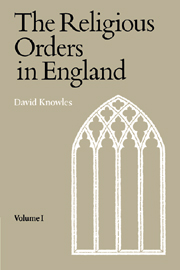Book contents
- Frontmatter
- Contents
- PREFACE
- LIST OF ABBREVIATIONS
- Part One The Old Orders, 1216—1340
- Chap. I The thirteenth century
- Chap. II Reorganization among the Black Monks, 1216–1336
- Chap. III The Augustinian chapters, 1216–1339
- Chap. IV The exploitation of the land
- Chap. V Henry of Eastry
- Chap. VI The monastic administration
- Chap. VII The agrarian economy of the Cistercians
- Chap. VIII The system of visitation
- Chap. IX The first century of visitation: (I)
- Chap. X The first century of visitation: (II)
- Part Two The Friars, 1216–1340
- Part Three The Monasteries and their World
- Appendices
- Bibliography
- Index
Chap. I - The thirteenth century
Published online by Cambridge University Press: 03 December 2009
- Frontmatter
- Contents
- PREFACE
- LIST OF ABBREVIATIONS
- Part One The Old Orders, 1216—1340
- Chap. I The thirteenth century
- Chap. II Reorganization among the Black Monks, 1216–1336
- Chap. III The Augustinian chapters, 1216–1339
- Chap. IV The exploitation of the land
- Chap. V Henry of Eastry
- Chap. VI The monastic administration
- Chap. VII The agrarian economy of the Cistercians
- Chap. VIII The system of visitation
- Chap. IX The first century of visitation: (I)
- Chap. X The first century of visitation: (II)
- Part Two The Friars, 1216–1340
- Part Three The Monasteries and their World
- Appendices
- Bibliography
- Index
Summary
The epoch of history which opens with the pontificate of Innocent III presents to the student of ecclesiastical institutions and of religious sentiment an appearance very different from that which had gone before. Even if we set aside the personal influence of the great pope himself in originating and determining the paths to be followed in European politics by his successors, and set aside also the circumstance that his reign coincided with the formal organization of university life in north-western Europe, two momentous and unpredictable events which occurred in the first decades of the thirteenth century gave a stamp to all that followed. The new orders of friars inaugurated a wholly original ideal and type of organization in the religious life, and the establishment at the Fourth Lateran Council of a code of disciplinary decrees gave a legal basis for a system of ecclesiastical administration different in method from all that had gone before. Necessary though it may be to trace the origins and causes of the new developments far back into the past, and to recognize the perseverance of much that was old, it yet remains true that the years between 1205 and 1215 are a watershed in religious history, and that no other decade has such significance for the spiritual and institutional life of the Church until the early years of the sixteenth century are reached.
This judgement, valid in a measure for all western Europe, is peculiarly true for England.
- Type
- Chapter
- Information
- Religious Orders Vol 1 , pp. 3 - 8Publisher: Cambridge University PressPrint publication year: 1979



